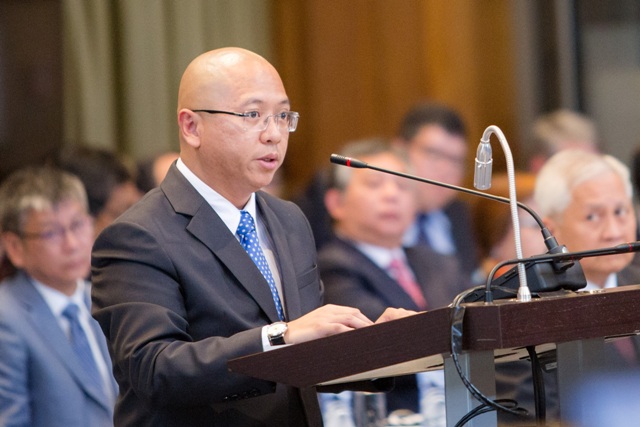A FORMER solicitor general urged Filipinos to be wary of “selfish” political schemes of the Duterte administration before agreeing to amend the 1987 Constitution.
Former solicitor general Florin Hilbay, a UST economics alumnus, said it was important to check President Rodrigo Duterte’s “dictatorial tendencies” and assess the suspicious activities and motives of the administration.
“[W]ell, the President himself says he is a dictator. What is the nature of a dictator? A dictator is someone who doesn’t respect the Constitution. So tapos na `yung argumento,” he said in a charter change forum in UP Diliman.
Duterte announced in a recent Palace meeting with former communist rebels that nothing would happen in the country if he would not become a dictator.
His statement came days before the country was set to commemorate the 32nd Edsa People Power Revolution that ousted the late dictator Ferdinand Marcos.
Hilbay cited the administration’s shakedown of the press, the Commission on Human Rights and opposition lawmakers as some of the “suggestive” reasons that the administration was prone to “rig” the constitution to its own interests.
“So we need to assess our decision on whether or not we want to support charter change based on the credibility of the administration,” he said.
Maria Fe Mendoza, professor at UP Diliman, also said Filipinos should be aware of the “self-serving” motives of politicians.
“We should be wary of political motives because like in the past, self-serving amendments ang pino-propose nila. So `yon dapat ang bantayan natin,” she said.
Last Jan. 25, the President named 19 members to a 25-man charter change panel tasked to study and review the provisions of the 1987 Constitution. The committee is headed by former chief justice Reynato Puno.
Included in the charter change plan is a shift to a federal system of government from a unitary system, a campaign promise of President Duterte.
Under a federal system, the powers of the central government will be distributed to local government units or regions.
The Federalism Institute of President Rodrigo Duterte’s Partido Demokratiko Pilipino-Lakas ng Bayan (PDP-Laban) submitted a draft of a federal constitution in September 2017.
The draft proposed a semi-presidential system wherein the elected president will be the head of state, while the prime minister nominated from the roster of Federal Assembly members will head the government.
Alternatives to charter change
Mendoza said empowering local governments did not require a charter change, as it could be done by amending the Local Government Code of 1991—a law that transferred several national government functions to local governments and established mechanisms of recall.
“The local government code is now more than 25 years old and they say that it’s a failed experiment, but there are many studies that will say that the local government code has achieved what it has intended to do,” she said. “If we want to improve decentralization, we should amend the local government code.”
Former Quezon representative Erin Tañada reiterated the need for amendments to the code, saying it must be reviewed every five years.
“Dapat, after every five years, kailangan pag-aralan ang kailangang baguhin sa ating local government code. Unang tanong, nagawa ba yan o hindi? Kung hindi nagawa `yan, bakit hindi nagawa,” he said.
Hilbay said that with the President’s strong political will, amending the code should not be a problem.
“Under a President that’s very confident about [his] political will, then I’m quite certain [that] they can pass a local government code that can respond to the problem of physical struggling of the unbelievable control of Manila over the finances and the economic direction of the provinces,” he said.
‘Know your constitution’
Mendoza stressed the importance of knowing the Constitution to understand the consequences of a shift to a federal system.
“We have to be aware and we have to start reading our Constitution, so we will know what we will risk if there is an overhaul of the 1987 Constitution,” she said.
A 2016 Pulse Asia survey showed that 73 percent of the Filipinos “have little or no knowledge of the constitution” while 27 percent have “substantial knowledge of the constitution.”
To investigate and expose unspoken issues and anomalies, send confidential news tips to the Special Reports team of the Varsitarian at specialreports.varsitarian@gmail.com or at THE VARSITARIAN office, Rm. 105, Tan Yan Kee Student Center, University of Santo Tomas, España, Manila.



















